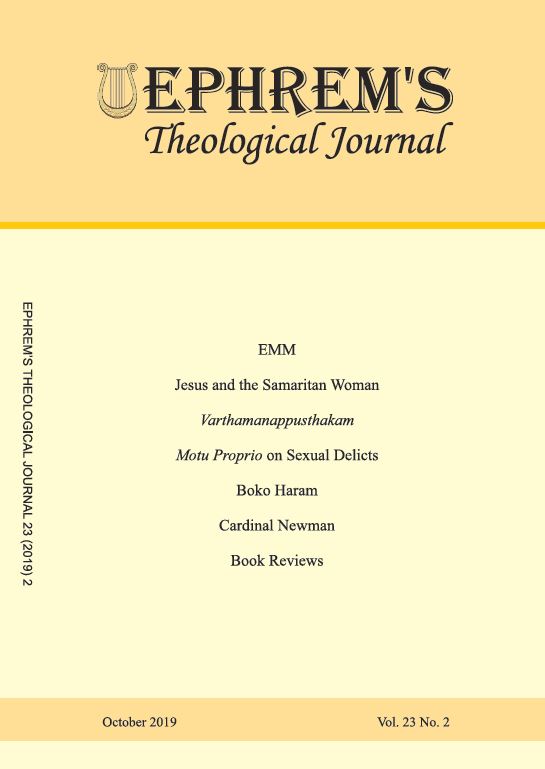ETJ 23/2 (2019)

The present issue of ETJ comes to you as the church is celebrating
an “Extraordinary Missionary Month” in October 2019, in commemoration
of the centenary of the Apostolic Letter, Maximum Illud of Pope Benedict
XV in 1919. Maximum Illud was published with the aim of giving a renewed
vigour to the missionary activity of the church and to dispel any
misunderstanding that might have surrounded the missionary work such as
expansionist, nationalistic or colonial overtones. The sole purpose of
missionary activity consists in proclamation and spreading the love of the
Lord Jesus, by holiness of one’s life and good works. It sought to encourage
the church and especially the priests to engage in the missionary activity
with a sense of duty, considering the signs of the times. The missionary
mandate given by Jesus actually defines the missionary vocation of the
church. It cannot be understood as a separate duty; it is the duty.
Missionary work keeps the church alive and dynamic.
Therefore whenever the church relapses into inactivity, it becomes sleepy
and slothful. As Pope Francis said in his opening message for the EMM,
“this challenge remains as urgent as ever.” What is needed is “a missionary
option capable of transforming everything, so that the Church’s customs,
ways of doing things, times and schedules, language and structures can be
suitably channelled for the evangelization of today’s world rather than for
her self-preservation.” This aspect of going to the world is very important.
Church will have to undertake new ventures, experiment new areas, forget
for a while the secure and sure beaten paths in favour of adventurous and
self emptying ways of meeting people with the good news. Pope has set the
aim of EMM as “fostering an increased awareness of the missio ad gentes
and taking up again with renewed fervour the missionary transformation of
the Church’s life and pastoral activity.”
In the context of EMM it is necessary to make an assessment
of the missionary strategy followed by the church in India. Missio ad gentes
has become somewhat sluggish, main reason being the hostile environment
created and maintained by the political powers that are. Intimidation, threats,
physical assaults, taking into police custody after false charges etc are on the
increase in various Indian states, especially in Jharkhand.
Jharkhand state has sought a federal investigation into 31 charity
organizations, most of them Catholic, to check for the mishandling of
overseas donations, suspecting them to have diverted donated funds. Church
leaders see in this attempt to slander them and Christianity as a whole. In
early September Father Julian Ekka, the vice principal of the Jesuit-run De
Nobili School in Koradih, Dhanbad district and the nurse, Emerencia
Lomga, were arrested following a complaint from the father of an alleged
victim, based on “circumstantial evidence.” Another Jesuit, Father Alphonse
Aind, was jailed for life in connection with a gang-rape case in June 2018.
He is still languishing in a cell as his appeal against conviction is pending in
the state court. Church leaders in the state say these cases were fabricated
amid a hostile atmosphere being generated toward the state’s Christians,
mostly tribal people.
Catholic priest Father V. J. Binoy and catechist Munna Hansda were
arrested and jailed from Godda district in early September following
allegations that they violated the state’s anti-conversion law and grabbed the
lands belonging to a tribal man. Fr. Binoy was granted bail but Mr Munna is
still in jail. A mob of some 500 suspected Hindu hardliners vandalized the
Jesuit-run St. John Berchmans Inter College, Mundli Tinpahar in Jharkhand
on Sept. 3 but the police have still not yet arrested the culprits, even after the
mission officials named more than 25 of them in a complaint. Many cases of
harassment have been recorded from Jharkhand alone. It must be
remembered that it is in the same land that foreign and Indian missionaries
have worked selflessly for the uplift of the native people, forgotten by the
ruling class and oppressed by the landlords and the rich. One wonders
whether such harassments, baseless accusations, mockery of justice etc serve
the welfare and peaceful co-existence of the people of the state.
The Church’s mission to educate tribal people has resulted in
hundreds of them accepting the Catholic faith, resulting in a stronger
Christian community in Jharkhand. “May the Extraordinary Missionary
Month prove an intense and fruitful occasion of grace, and promote
initiatives and above all prayer, the soul of all missionary activity. May it
likewise advance the preaching of the Gospel, biblical and theological
reflection on the Church’s mission, works of Christian charity, and practical
works of cooperation and solidarity between Churches, so that missionary
zeal may revive and never be wanting among us” (Pope Francis).
There are five articles and a few book reviews in this issue of ETJ.
The first article is by Sr Priya Paul CMC and it is titled “From Rejection to
Invitation (John 4:1-42): Toward a Relational Ethics for the Followers of
Messiah.” The second article is a study of “Varthamanappusthakam” and it
is authored by Fr Dominic Vechoor. In the third article Fr George
Thekkekara studies the new motu proprio on sexual delicts and is titled, “An
Overview of the Vos Estis Lux Mundi.” Fr. Emmanuel Anagwo deals with
the menace of Boko Haram in Nigeria, which has global ramifications, in
the fourth article. Sr. Merlyn George SCSC writes the fifth article on “Saint
John Henry Newman.” A few book reviews are also included in this issue.
Chief Editor
View The Document

